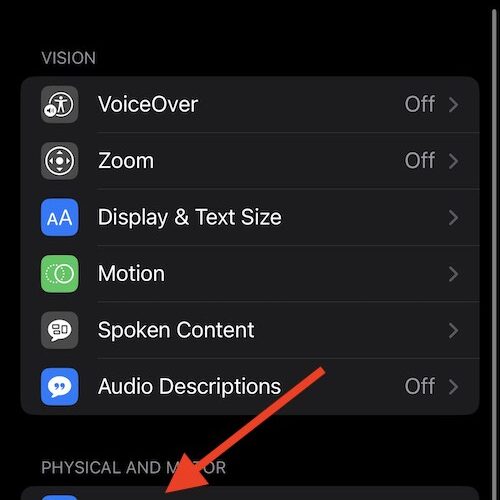If you find yourself unable to turn off Switch Control on your iPad and iPhone, you’re fortunately not alone. In fact, it’s possible you had no idea what this setting even was until you found it turned on. One of the nicest thing about Apple products is the company’s focus on Accessibility. Cupertino likes to make devices that virtually anyone is able to use to the device’s fullest capabilities, and that’s truly great. However, some of the features that are a means to help people can also be a massive detriment if not set up properly.
I’m going to take a look at Switch Control on iPad and iPhone. For those that need to know, I’m going to explain what Switch Control is and how you are able to turn it on. I’ll also explain how you are able to turn it off, as well as briefly explain some reasons as to why a user might have issues disabling this feature. Switch Control is incredibly useful for those that need it, but the specifics of the feature may cause some users to accidentally enable something they shouldn’t. Let’s take a look at our options.
What is Going on?
For those using iOS or iPadOS, Switch Control helps users navigate their device. This setting allows users to use either their iPhone or iPad by having the device highlight items sequentially as they appear on the screen. For example, when you go to turn on this setting, you’ll actually receive a notice stating that this feature will change how your device controls and operates. It will then give you the option to cancel this setting, but it also shows you how it sequentially changes your options. Essentially, think of it like a helpful version of the show Press Your Luck, if that helps.
Switch Control also allows for additional devices to connect in order for Switch Control to properly work. This can be something like an external Bluetooth switch, or even using your camera to allow parts of your body to control the switches. While this feature can indeed be helpful for those that need it, problems can potentially arise if a user does not set up Switch Control properly. That’s where these solutions come in handy. While there are measures in place to prevent this from happening, there are still reports online of users running into trouble accidentally setting up Switch Control when they didn’t mean to.
Why Can’t I Turn Switch Control on My iPhone?
If you find that Switch Control is greyed out, or it appears that you are unable to interact with it or even enable it, this is more than likely due to having another Accessibility feature enabled. Most likely, Switch Control is greyed out due to AssistiveTouch being turned on at the same time. Due to both of these features performing similar duties, you will not be able to have both of them enabled.
Time needed: 1 minute.
If you need to check to see if you need to turn off AssistiveTouch, simply follow these steps:
On your iPhone, navigate to Accessibility.
Select Touch.
Assistive Touch should be at the top of the screen. Check to see that it is set to Off.
If it is On, click the AssistiveTouch option and set it to Off.
Once you know AssistiveTouch is turned off, check to see if you are able to turn on Switch Control. If Switch Control is still greyed out, look through your other Accessibility settings to see what else is enabled.
Why Is Switch Control Greyed Out iPad?
The iPad is also going to follow the same rules as the iPhone. If you have AssitiveTouch turned on, you are not going to be able to turn on Switch Control. Again, this is because Switch Control is going to have many of the same functions as AssitiveTouch, just performed in a different way.
Just like the iPhone, AssistiveTouch can be disabled by going to AssistiveTouch and making sure it is disabled. You should then be able to enable Switch Control by going to Switch Control.
Some users are experiencing issues where they are unable to turn off Switch Control once they enable it. However, this is most likely due to not fully knowing how to turn it off. Turn off Switch Control should be as simple as triple-clicking the Home button or Sleep/Awake button on your device.
How Do You Exit Switch Control on iPhone?
However, what if you break your Home button? If you have a broken Home button, you may be under the impression that you are unable to disable Switch Control. However, this is not entirely the case. There are still some options. You can try navigating to Switch Control to see if that helps you. You may need to wait for Switch Control to ‘circle’ back around again. Note that it will have a blue highlight around things that you can select.
Switch Control is under Accessibility within Settings.
If you’re not able to touch your screen for some reason, you also have a couple of options. There are reports online of users accidentally enabling Switch Control, and then through accident, also enable a setting that doesn’t allow them to touch their screen. If you find yourself in this situation, you have a couple of options.
How Do You Exit Switch Control on iPhone?
If this doesn’t work for you, you may need to restore your iPhone to a previous backup. Both iTunes and Finder are going to look relatively similar, so you can easily find the Restore options under the General tab. Likely it will be one of the first things you see when plugging in your device.
You can find the ability to restore your iPhone in the General tab in either Finder or iTunes.
Some places on the internet suggest using iTunes or Finder to disable this setting. While it is true that you can find certain Accessibility options when you scroll down in the General category, Switch Control is not one of the given options. I will note that I’m running a current version of macOS Catalina (13.3.1 at the time of this writing), so older version of iTunes may have it. There are also reports of users being able to ask Siri to shut off Switch Control, though I was not able to get this to work. Perhaps you may have better luck, but I wouldn’t rely on it.
How Do I Turn Off Switch Control on My iPad?
Following any of the above steps should also work with iPad. You can disable Switch Control by triple-clicking your Home button or Sleep/Wake button. You can also find the setting through Switch Control. Unfortunately, this is about as far as it goes with disabling features. Just like with iPhone, if neither of these solutions work for you, a Restore before you enabled the setting will likely be your best option.
Accessibility and Solutions
As mentioned, this feature can be extremely helpful for those that need it, but those that turn it on by accident may find themselves having an issue turning it back off. However, remember to take a look at each solution provided carefully, as there are several options available that should get you back on track. It seems like the issue people are having the most trouble with is someone accidentally having a problem with the outside device settings.
Accessibility is virtually never a bad thing. The more users are able to access the features of their device, the better experience they will have overall. Of course, sometimes these features can accidentally cause turmoil for those that don’t know they need them. Fortunately, a solution typically isn’t too far behind. If you’re still having issues, however, maybe you might need to know how to restore or reset your iPhone without using iTunes. Users may also want to know what they can do if they need to fix a blurry iPhone screen. Just remember that whenever there’s a problem, a solution usually isn’t too far behind.
Tags: Accessibility, featured, iPad, iPhone
The Mac Observer
Can’t Turn off Switch Control? Here’s How on iPhone and iPad



